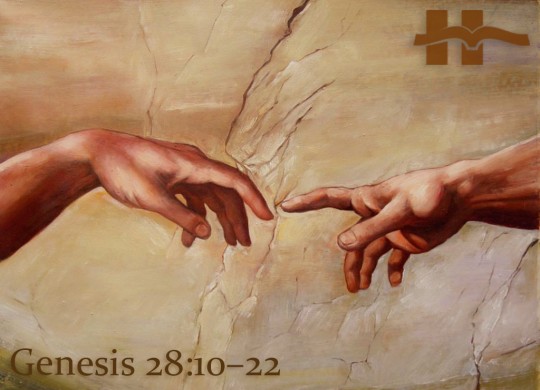Genesis 28:10−22

God’s guaranteed promises call for a response of trusting worship.
Jacob is on the run from his brother who has developed homicidal tendencies after being cheated of his blessing. The deceiver is headed to his uncle’s house. Jacob’s arrival at the “place” is apparently no accident: the verb indicates that Jacob “encountered/struck” the place (28:11). The narrator records what Jacob’s eyes see, with a threefold repeat of “behold!” (28:12, 13, 15), escalating each time: “Behold, a ladder!” “Behold, the angels of God!” “Behold, Yahweh!” All these vividly emphasize the transcendent nature of what was observed, an awe-inspiring scene, as Jacob later confesses (28:17). It is a grand spectacle, with Yahweh, angels, and a stairway linking heaven and earth, combining to lend gravitas and divine authority to what is to follow: Yahweh’s promises (28:13–15). This shock and awe was intended to inspire confidence in God’s assertions. Unfortunately the demonstration did not succeed with the hard-boiled agnostic that Jacob was.
The promises to Jacob are even more dramatic than the ones to his father and grandfather: at least Abraham and Isaac were married when these promises were bestowed, though childless; Jacob, on the other hand, is not even married, and he is promised numerous descendants through whom the world will be blessed. That God would be with the patriarch is guaranteed; that he would keep him wherever Jacob might go is pledged; and that Jacob would return to Canaan one day is assured. A series of six phrases with Yahweh as the subject reinforce the theme of his promise: “I am,” “I will keep,” “I will return,” “I will not leave,” “I have done,” “I have promised” (28:15); each time the object is Jacob.
Though Jacob acknowledges the transcendent vision he has just seen (28:16–18), his reciprocal vow is quite striking in its audacity and imprudence. Notice the correspondence between God’s utterances (bold) and Jacob’s vow.
“I am with you” (28:15a)
“If God will be with me” (28:20b)
“And I will keep you” (28:15ba)
“And [if] he will keep me” (28:20cα)
“wherever you go” (28:15bβ)
“on this way that I am going” (28:20cβ)
“And [if] he will give me food … and garments” (28:20d)
“And I will return you” (28:15cα)
“And [if] I return (28:21aα)
“to this land” (28:15cβ)
“in peace—to my father’s house” (28:21aβ)
“I shall not leave you” (28:15d)
“And [if] Yahweh will be my God” (28:21b)
“Then this stone will be God’s house” (28:22a)
“And I will surely give a tenth to you” (28:22b)
Jacob demonstrates considerable hubris: he is clearly not taking God at his word. Even that clause in 28:21b appears to be laying down a condition for God to fulfill: “If Yahweh will be God to me.” He has just heard Yahweh identify himself as the “God of Abraham your father, and the God of Isaac.” Jacob is now demanding that this Yahweh be the “God of Jacob,” too. And, if that were not enough, he dares to add an extra condition: food and clothing! Not only does Jacob disregard land in favor of victuals and raiment, his demand focuses on himself: “give me,” without any thought about posterity (28:14). Jacob’s interests seem far more parochial, insular, and self-serving. Not to mention his preoccupation with his own personal return to his “father’s house,” while God’s interests are more farsighted and global—to return him to “this land,” the Promised Land. In other words, Jacob is trading promises with God: if God keeps his promises, then I’ll keep mine! Rather, the response to God’s promises ought to have been worship, for what he is going to do.











 Abe Kuruvilla is the Carl E. Bates Professor of Christian Preaching at The Southern Baptist Theological Seminary (Louisville, KY), and a dermatologist in private practice. His passion is to explore, explain, and exemplify preaching.
Abe Kuruvilla is the Carl E. Bates Professor of Christian Preaching at The Southern Baptist Theological Seminary (Louisville, KY), and a dermatologist in private practice. His passion is to explore, explain, and exemplify preaching.